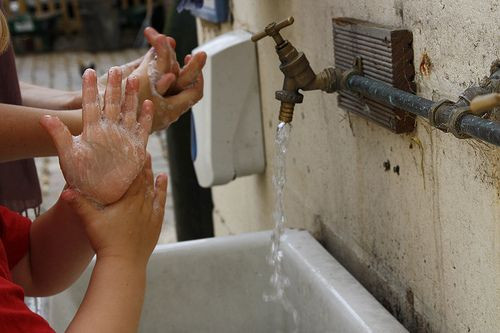Doctors Wash Hands Incorrectly 40% Of The Time In Several Countries, Despite WHO Awareness Program

Five countries examined in a two-year study found that many doctors wash their hands incorrectly and ineffectively, failing to reduce the risk of spreading infections between patients and fellow hospital staff, United Press International (UPI) reports.
Forty-three hospitals in Costa Rica, Italy, Mali, Pakistan, and Saudi Arabia comprised the study, which took place from 2006 to 2008 and, according to UPI, found that a full 40 percent of doctors don’t wash their hands properly. While nurses observed best practices 71 percent of the time, the World Health Organization (WHO) has outlined specific methods in order to guarantee the transmission of infectious disease comes to a halt.
WHO’s hand hygiene compliance strategy consists of five main components:
1) Ensuring healthcare workers have access to alcohol-based handrub at the point of patient care
2) Training and educating healthcare workers on the most important times in patient care for hand hygiene
3) Monitoring and feedback on compliance
4) Visual reminders at the point of care in the workplace
5) Creation of a culture of attention to patient and healthcare worker safety within the institution
“Sometimes the simplest and most cost-effective interventions can have the greatest impact,” said WHO Envoy for Patient Safety, Sir Liam Donaldson. “We now have the effective methods to eliminate millions of avoidable sicknesses and death, and reduce the growing problem of antimicrobial resistant infections.”
What researchers found in the selected countries were doctors and nurses who were largely, and surprisingly, uneducated in the ways that disease can spread throughout a hospital. The team noted 21,884 hand hygiene opportunities during 1,423 sessions before the intervention and 23,746 opportunities during 1,784 sessions after — seeing an overall jump in compliance from 51 percent to 67 percent. The greatest leaps were made in low- to middle-income areas, with high-income areas experiencing little change.
“As resistance to antibiotics and other key medicines becomes more common,” said Edward Kelley, coordinator of the Patient Safety Program at WHO, “it is more essential than ever to reduce the number of avoidable infections in hospital.”
Infection prevention is only one pillar of WHO’s mission to reduce microbial resistance around the world. Other pillars include appropriate national policies and plans, improving surveillance of these resistant pathogens, uninterrupted access to good quality essential medicines, proper use of medicine, and more research and development of new treatments.
According to WHO, the most commonly transmitted infections as a result of improper hand washing are urinary tract and surgical site infections, pneumonia, and infections of the bloodstream. Often, these infections result from medicine-resistant germs, such as methicillin-resistant S. aureus (MRSA).
"WHO's hand hygiene improvement strategy is recommended by both the U.S. and European Centers for Disease Control, the Joint Commission International and accredited bodies, and almost all professional organizations worldwide," Didier Pittet, the study's senior author and director of the WHO Collaborating Center on Patient Safety, said in a statement.
To date, more than 15,700 healthcare settings in 168 countries worldwide have adopted WHO’s hand hygiene strategies.
Published by Medicaldaily.com



























